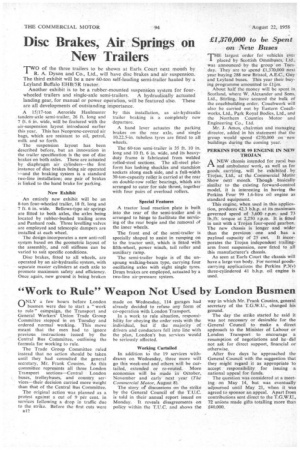"Work to Rule" Weapon Not Used by London Busmen
Page 46

If you've noticed an error in this article please click here to report it so we can fix it.
QNLY a few hours before London busmen were due to start a "work to rule" campaign, the Transport and General Workers' Union Trade Group Committee stepped in on Tuesday and ordered normal working. This move meant that the men had to ignore previous instructions issued by the Central Bus Committee, outlining the formula for working to rule.
The Trade Group Committee ruled instead that no action should be taken until they had consulted the general secretary, Mr. Frank Cousins. As this committee represents all three London Transport sections—Central London buses, trolleybuses, and country services—their decision carried more weight than that of the Central Bus Committee.
The original action was planned as a protest against a cut of 9 per cent. in services following a drop in traffic due to the strike. Before the first cuts were ni2 made on Wednesday, 114 garages had already decided to refuse any form of co-operation with London Transport.
In a work to rule situation, responsibility for obeying the order rests with the individual, but if the majority of • drivers and conductors fell into line with the plan, London's bus services would be seriously affected.
Working Curtailed
In addition to the 19 services withdrawn on Wednesday, three more will go this week-end and others will be curtailed, extended or re-routed. More economies will be made in October, November and early next year (The Commercial Motor, August 8).
The story of discussions on the strike by the General Council of the T.U.C. is told in their annual report issued on Monday. It reveals disagreements on policy within the T.U.C. and shows the
way in which Mr. Frank Cousins, general secretary of the T.G.W.U., changed his ground.
The day the strike started he said it was not necessary or desirable for the General Council to make a direct aphroath to the Minister of Labour or London Transport to encourage a resumption of negotiations and he did not ask for direct support, financial or otherwise.
After five days he approached the General Council with the suggestion that they might regard it as appropriate to. accept responsibility for issuing a national appeal for funds.
The question was considered at a meeting on May 14, but was eventually adjourned until May 21, when it was agreed to sponsor an appeal. Apart from contributions sent direct to the T.G.W.U., 72 unions made gifts totalling more than £40.000.




















































































































